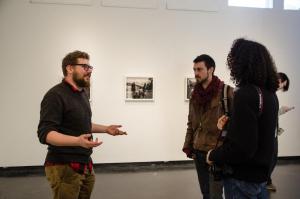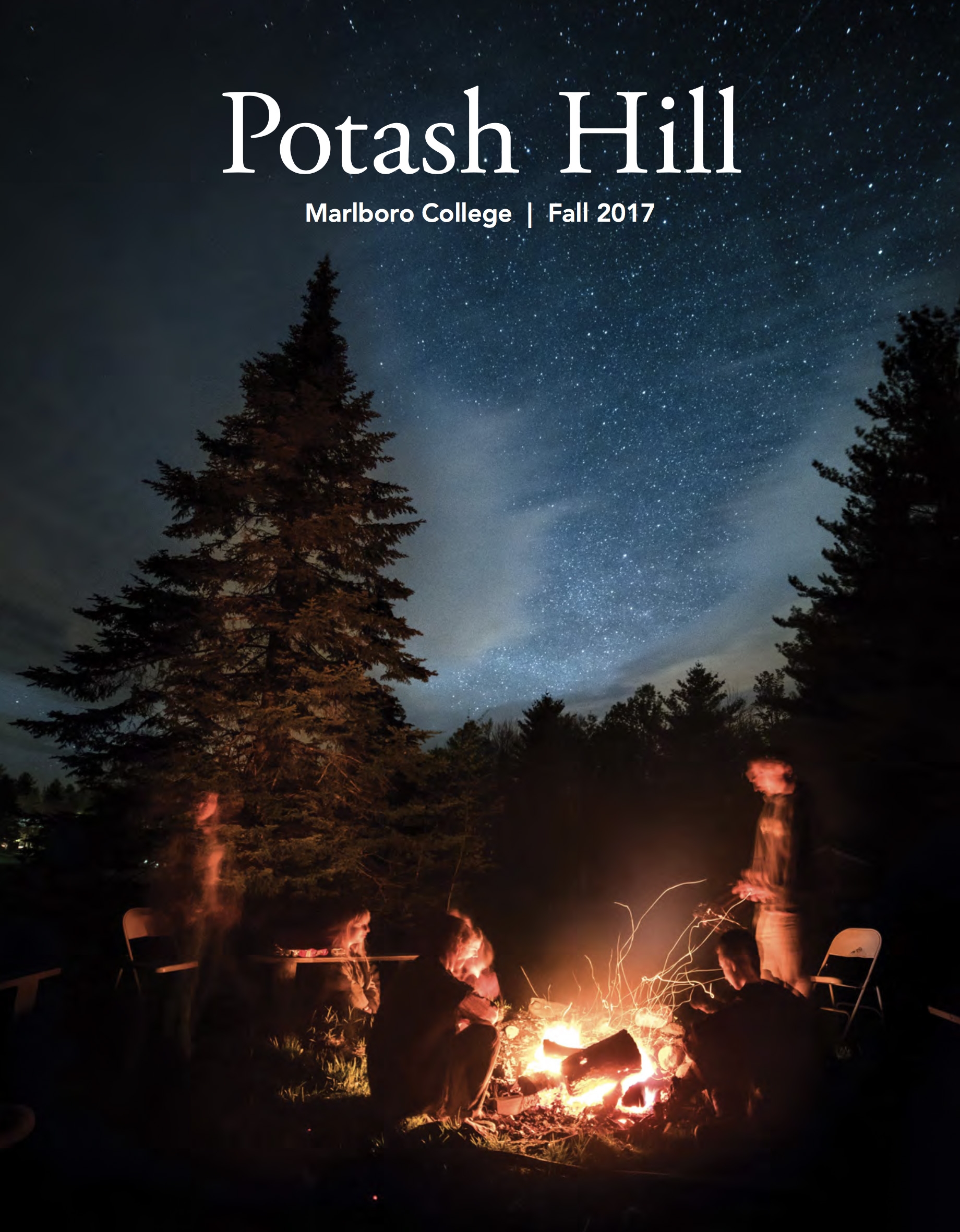
Faculty Q&A
Last February, junior Emmett Wood sat down with music professor Matan Rubinstein to discuss composition, collaborating with students, and leading pop bands in the Israeli army. You can read the whole interview.
EMMETT WOOD: How would you characterize your early career in music?
MATAN RUBINSTEIN: I began at a very young age, playing piano. I got my first professional engagement around age 16. Then there was the army. In Israel, it’s a mandatory service of three years. I was an arranger for the army band, which is probably the least combatant job you could have in the army. The Israeli army has these small groups that go to entertain the troops, and so my job was to write arrangements and rehearse with those groups. It was really a ridiculous job. In a very, very loose sense, I’m a veteran.
E: Have you been composing recently?
M: I’m active all the time: I compose and I play. I just finished a commission for a solo cello piece, but I’ve done some music for dance. Two years ago I scored a documentary film soundtrack. So I’ve been doing music for film and dance. I never really stop.
E: And you’re always working with Plan students?
M: Yeah, improvisation, electronic music, some sound design.
E: What do you like about working with Marlboro students?
M: My favorite aspect of working with people here is how enthusiastic and open-minded they are—this is almost without exception. People come here and they are open to unorthodox ideas, and when that is coupled with discipline it’s really a remarkably good experience teaching here. It’s never dull. I get to hear thoughts that I never would have thought of myself, which is always a gift.
Focus on Faculty
 Professor of religion Amer Latif gave a talk at the June annual meeting of the Windham World Affairs Council titled “An Islamic Christmas Tree: Insights from Cognitive Science on Making Peace.” His presentation outlined a way to forge a rigorous method for making peace, at a deep level, between apparent religious contradictions—a way of finding harmony and unity that accommodates difference and multiplicity. Amer also discussed how this method appears from the perspective of contemporary cognitive science on the nature of human understanding. He is currently working on a book titled “Only God is Good”: Islam in the Words of Jesus.
Professor of religion Amer Latif gave a talk at the June annual meeting of the Windham World Affairs Council titled “An Islamic Christmas Tree: Insights from Cognitive Science on Making Peace.” His presentation outlined a way to forge a rigorous method for making peace, at a deep level, between apparent religious contradictions—a way of finding harmony and unity that accommodates difference and multiplicity. Amer also discussed how this method appears from the perspective of contemporary cognitive science on the nature of human understanding. He is currently working on a book titled “Only God is Good”: Islam in the Words of Jesus.
In May, retiring writing and literature teacher T. Hunter Wilson regaled students, faculty, and other admirers in the library reading room with a retrospective reading of his work. Ominously titled “The Final Reading,” the event featured some prose, including essays about his travels in Vietnam and Laos, but mostly poems, including old, recent, and new work.
Management co-chair Lori Hanau was thrilled to interview Anahita Joon Tehrani in support of the transformational coach’s project to convene a “new women’s movement” as a global virtual summit. “It has been my deep privilege to be part of a project that seeks to bring forth the nurturing powers of the sacred feminine to heal and unite, during a time when separation and fear are dominating our airwaves,” says Lori. Her interview, titled “The Undefended Heart: Upgrading Our Humanity through Shared Leadership,” is part of a series available by donation (all proceeds go toward ending human trafficking and slavery) at thenewwomensmovement.com.
In February, the faculty convened an Indigenous Voices in Mesoamerica panel, a presentation and discussion about indigenous stories from Mexico, Guatemala, and Belize. The panel featured Spanish language and literature professor Rosario de Swanson, anthropology professor (emeritus) Carol Hendrickson, theater professor Jean O'Hara, and senior Trevor Avery, and was followed by a Mesoamerican-themed community dinner.
“In many ways, this task of developing engaged citizens echoes the quintessential role of higher education: developing lifelong learners,” says President Kevin Quigley in an April Huffington Post editorial titled “Citizenry Is Learned and Earned.” Kevin touts the essential role of higher education— specifically liberal arts colleges and universities—in ensuring that graduates become engaged citizens, and the importance of such citizens in the continued viability of our democracy. “At Marlboro College, citizen engagement is in our DNA. It is who we are and what we do.” Read more.
Photography professor John Willis has embarked on a collaborative project to create a new photo book on the Standing Rock Tribe’s movement against the Dakota Access Pipeline and on Oceti Sakowin Camp. Building on his own images from several visits to the camp, John is hoping to collect contributions of photos and voices of Native Americans, and to edit the book with a Native American contributor. “I hope the book will honor the indigenous- led movement, and we can represent the concept of working together in a new way while respecting the value of the Native-led approach to the movement,” said John. Learn more at jwillis.net.
In March, graduate faculty member and founder of the Women’s Leadership Circles program Kerry Secrest helped facilitate an open meeting in Brattleboro on the Vermont Equal Pay Compact, the employer pledge to close the gender wage gap. Also a member of the Vermont Commission on Women, Kerry was joined by Cary Brown, executive director of the Vermont Commission on Women, and Jackie Cook, of the Department of Labor’s Women’s Bureau. Marlboro College is a proud signatory of the Equal Pay Compact.
In April, philosophy professor William Edelglass gave a lecture for Earth Day at the University of Utah. He also recently gave a series of public lectures on the history of the concept of race. This summer, William gave a commencement address at his alma mater, St. John’s College, in Sante Fe. Among his publications this year is “Buddhism, Happiness, and the Science of Meditation,” in Meditation, Buddhism, and Science, edited by David L. McMahan and Erik Braun, published by Oxford University Press. Working with collaborators in Brattleboro, William recently received a $150,000 matching grant from the National Endowment for the Humanities to build community through humanities work.
“Through the retelling of her story, the poet claims blackness and African roots as pillars of Peruvian culture,” says Spanish language and literature professor Rosario de Swanson, referring to Afro-Peruvian writer Nicomedes Santa Cruz. Rosario published an article on Santa Cruz’s poem “Ritmos Negros del Perú” in a recent issue of Hispania, the flagship journal of the American Association of Teachers of Spanish and Portuguese. In her article, she argues that the poem opens the door for the “decolonization of Peruvian history and culture.” Meanwhile, Rosario was elected for appointment to the AP Spanish Literature and Culture Development Committee for Educational Testing Service (ETS), where she works during the summer.
In April, Marlboro screened the documentary Jim: The James Foley Story, followed by a discussion and Q&A by visiting politics professor Clare Gillis. The film tells the story of American photojournalist James Foley, who was kidnapped in Syria in 2012 and went missing for two years before the infamous video of his public execution sent shockwaves and introduced much of the world to ISIS. Clare is one of Foley’s journalist colleagues featured in the film, which includes intimate interviews with Jim’s family, friends, and other fellow journalists. She and Foley became close friends in 2011, when they were detained together in Libya by the Gaddafi regime. In July, Clare also gave a talk titled “Refugeehood from World War II until the Present,” part of a five-part series on refugees in the U.S., sponsored by the MA in TESOL program.
A special concert in the Music for a Sunday Afternoon series in April featured the compositions of retiring music professor Stan Charkey, the Luis C. Batlle Chair in Music and the driving force behind the venerable series. On the eve of his retirement, this retrospective program of Stan’s works was performed by friends, family, and colleagues Andrew Eng (violin and viola), Anya Shemetyeva Merfeld (viola), Jake Charkey (cello), Paul Cohen (cello), Greg Jukes (percussion), and fellow Marlboro professor Matan Rubinstein (piano). Over the years, many of these works premiered in Paris, Los Angeles, and Washington, and of course Marlboro.
“We come together as poets, novelists, short-story writers, memoirists. We are writers together, regardless of the experiences that brought us here,” says John Sheehy, professor of writing and literature. He reflects on Marlboro’s Summer Writing Intensive in his editorial “Taking the Fight to the Page,” which appeared in a January issue of The Chronicle of Higher Education. John has led the Summer Writing Intensive, geared toward bringing together veterans as well as civilians through the art of writing, since 2014. “Many of the veterans write about war, but not all of them,” Sheehy says. “So do many of the civilians.… We are writers together, regardless of the experiences that brought us here.” Read more.
Marlboro was the first college in Vermont to be included in a Google Expeditions college tour, allowing prospective college students to experience virtual visits to campuses across the U.S., thanks to the efforts of Caleb Clark, chair of the Teaching with Technology program. “Now Marlboro can be visited virtually by those who may not have the opportunity to make the trip in person, by using smartphones or tablets to ‘look around’ our beautiful campus and read about key points of interest,” said Caleb. He received a grant from Google, which provided a 360-degree camera kit to capture the campus. Learn more.

